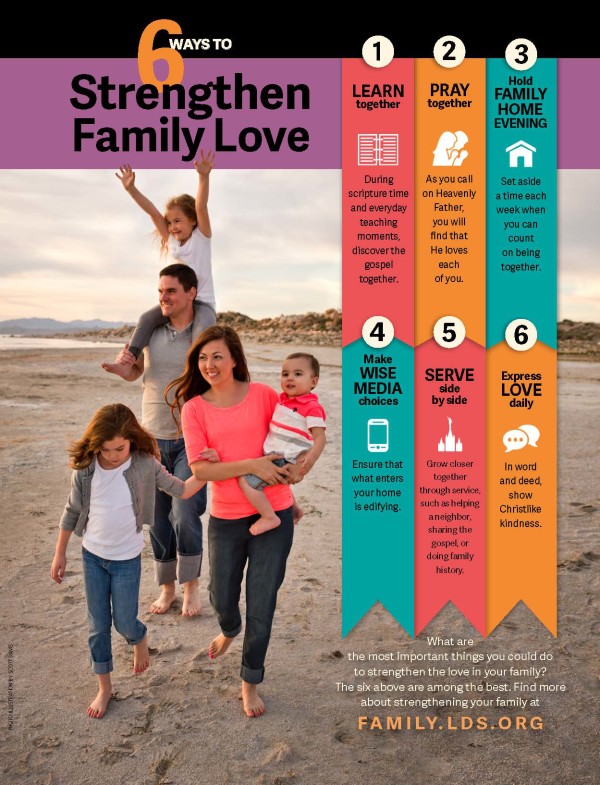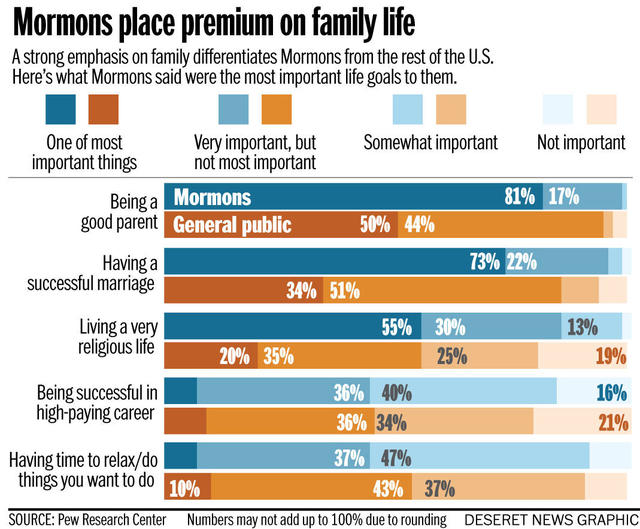According to a recently released study, Utah has the highest rate of “family belonging” in the United States. The high ranking could be attributed in part to the dense population of Mormon families in the state. The study also found that it would be an “error of historical proportions” if a state neglected the importance of marriage and family intactness.
 The health of the family is a priority for members of The Church of Jesus Christ of Latter-day Saints, often mistakenly called Mormons. In 1995, the First Presidency and the Council of the Twelve Apostles of The Church of Jesus Christ issued “The Family: A Proclamation to the World,” a declaration detailing the eternal nature of the family and the responsibilities of family members. Mormon families strive to fulfill the responsibilities outlined in this proclamation, including one that applies to this study: “Children are entitled to birth within the bonds of matrimony, and to be reared by a father and a mother who honor marital vows with complete fidelity.”
The health of the family is a priority for members of The Church of Jesus Christ of Latter-day Saints, often mistakenly called Mormons. In 1995, the First Presidency and the Council of the Twelve Apostles of The Church of Jesus Christ issued “The Family: A Proclamation to the World,” a declaration detailing the eternal nature of the family and the responsibilities of family members. Mormon families strive to fulfill the responsibilities outlined in this proclamation, including one that applies to this study: “Children are entitled to birth within the bonds of matrimony, and to be reared by a father and a mother who honor marital vows with complete fidelity.”
In introducing the proclamation for the first time, LDS Church President Gordon B. Hinckley warned of societal ills:
With so much of sophistry that is passed off as truth, with so much of deception concerning standards and values, with so much of allurement and enticement to take on the slow stain of the world, we have felt to warn and forewarn [and] now issue a proclamation . . . as a declaration and reaffirmation of standards, doctrines, and practices relative to the family which the prophets, seers, and revelators of this church have repeatedly stated throughout its history.
In his conclusion he said that the “strength of any nation is rooted within the walls of its homes” and urged people “everywhere to strengthen their families in conformity with these time-honored values.”1
The study was published by the Family Research Council’s Marriage and Religion Research Institute. Since 1983, the Family Research Council, located in Washington, D.C., has advanced faith, family, and freedom in public policy and the culture from a Christian worldview. Dr. Pat Fagan, director of the Family Research Council’s Marriage and Religion Research Institute said that “this year’s new derivative study from the ‘Index of Family Belonging and Rejection’ shows that the intactness of the family is immensely important in determining the success and failure of a child, a state, and our nation itself.” 
Nationwide, the Index of Family Belonging for the U.S. is now 45 percent, “meaning only 45 percent of U.S. teenagers aged 15 to 17 have grown up with both biological married parents.” According to the study, “in the average large city, just over three in ten teenagers have grown up with both married parents,” which is significantly lower than the national average Family Belonging Index. The Index “is the most robust measure of the health of the U.S. family available.”
According to Fagan, the structure of the family has “profound effects on an area’s economic well-being. There is no more important factor determining dependence on welfare programs that aim to fix organic poverty, such as TANF [Temporary Assistance for Needy Families] and food stamps. Our analysis shows family intactness is the second most important factor in an area’s level of poverty among women and children, as well as the top factor in determining an area’s teenage out-of-wedlock birth rate—a source of poverty itself. Family strength is as important in determining an area’s employment rate among men as the fraction of its adults that have completed high school.”
The proclamation issued by The Church of Jesus Christ called upon “responsible citizens and officers of government everywhere to promote those measures designed to maintain and strengthen the family as the fundamental unit of society.” Similarly, Fagan advised that,
“Congress and state legislatures . . . evaluate every new piece of public spending to ascertain whether it will increase or decrease the number of intact married families. Many, if not most, public spending streams decrease family intactness. This is totally irrational as a long-term strategy for the social infrastructure of the nation and guarantees decreased productivity and education attainment and increased dysfunctions in every area of social concern.”
Fagan also said that the “biggest challenge facing the nation is solving the problem of how broken families (where mother and father no longer raise their children together) can raise children who will have intact marriages. If we do not learn how to solve this problem, the U.S. will continue to decline.”
This article was written by Paula Hicken, a member of The Church of Jesus Christ of Latter-day Saints.
 Paula Hicken was an editor with the Neal A. Maxwell Institute for Religious Scholarship from 2000 to 2013. She earned her BA degree in English from Brigham Young University. She edited Insights, the Maxwell Institute newsletter, and was the production editor for Faith, Philosophy, Scripture, Hebrew Law in Biblical Times (2nd ed.), Third Nephi: An Incomparable Scripture, and was one of the copy editors for Analysis of the Textual Variants of the Book of Mormon. She also helped manage the Maxwell Institute intellectual property and oversaw rights and permissions. She has published in the Ensign, the Liahona, the LDS Church News, and the FARMS Review.
Paula Hicken was an editor with the Neal A. Maxwell Institute for Religious Scholarship from 2000 to 2013. She earned her BA degree in English from Brigham Young University. She edited Insights, the Maxwell Institute newsletter, and was the production editor for Faith, Philosophy, Scripture, Hebrew Law in Biblical Times (2nd ed.), Third Nephi: An Incomparable Scripture, and was one of the copy editors for Analysis of the Textual Variants of the Book of Mormon. She also helped manage the Maxwell Institute intellectual property and oversaw rights and permissions. She has published in the Ensign, the Liahona, the LDS Church News, and the FARMS Review.
Note:
1. Stand Strong against the Wiles of the World
The Family: A Proclamation to the World
About paulah
Paula Hicken was an editor with the Neal A. Maxwell Institute for Religious Scholarship from 2000 to 2013. She earned her BA degree in English from Brigham Young University. She edited Insights, the Maxwell Institute newsletter, and was the production editor for Faith, Philosophy, Scripture, Hebrew Law in Biblical Times (2nd ed.), Third Nephi: An Incomparable Scripture, and was one of the copy editors for Analysis of the Textual Variants of the Book of Mormon. She also helped manage the Maxwell Institute intellectual property and oversaw rights and permissions. She has published in the Ensign, the Liahona, the LDS Church News, and the FARMS Review.
Twitter •




